 Petzlover
Petzlover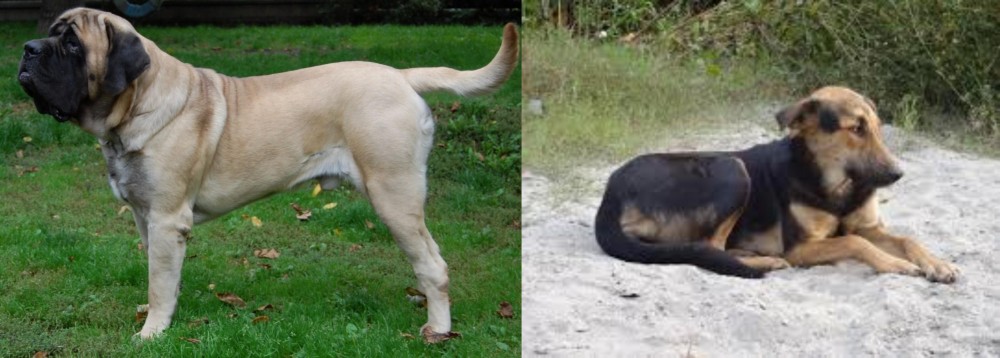 English Mastiff is originated from United Kingdom but Indian Pariah Dog is originated from India. English Mastiff may grow 12 cm / 5 inches higher than Indian Pariah Dog. English Mastiff may weigh 83 kg / 183 pounds more than Indian Pariah Dog. Both English Mastiff and Indian Pariah Dog has almost same life span. English Mastiff may have more litter size than Indian Pariah Dog. Both English Mastiff and Indian Pariah Dog requires Low Maintenance.
English Mastiff is originated from United Kingdom but Indian Pariah Dog is originated from India. English Mastiff may grow 12 cm / 5 inches higher than Indian Pariah Dog. English Mastiff may weigh 83 kg / 183 pounds more than Indian Pariah Dog. Both English Mastiff and Indian Pariah Dog has almost same life span. English Mastiff may have more litter size than Indian Pariah Dog. Both English Mastiff and Indian Pariah Dog requires Low Maintenance.
 Throughout most of history there have been images created by people of very large, sturdy dogs that they shared their space with. The English Mastiff can trace some part of her ancestry to these same dogs. This breed is thought to have come from the stock of ancient breeds such as the Alpine Mastiff, Pugnaces Britanniae and Alaunt. The Mastiff in general has then become a main descendent of many other breeds of dogs since the 1880’s. The images of these types of dogs goes back to the 5th and 6th century.
Throughout most of history there have been images created by people of very large, sturdy dogs that they shared their space with. The English Mastiff can trace some part of her ancestry to these same dogs. This breed is thought to have come from the stock of ancient breeds such as the Alpine Mastiff, Pugnaces Britanniae and Alaunt. The Mastiff in general has then become a main descendent of many other breeds of dogs since the 1880’s. The images of these types of dogs goes back to the 5th and 6th century.
There is no genetic evidence linking these dogs to the modern Mastiffs and the English Mastiff, but the resemblance is obvious. There is anecdotal evidence that these Mastiff type dogs were exported from England – the English Mastiff – to Greece to hunt game but were also used as war dogs by the Celts. The Alaunt was probably used the Normans and bred by the Alans. Writings and images throughout these times depicted a dog that looked very much like today’s English Mastiff. Some speculate that the English Mastiff came to the United States of the Mayflower.
There was a decline in the English Mastiff in its homeland in the 1800’s following the Cruelty to Animals Act of 1835 which prohibited owners and trainers from baiting animals. Then in the 19th century, prior to the first World War, systematic breeding programs began with J.W. Thompson. His first English Mastiff was a female named Dorah. Dorah’s ancestors included dogs from Thompson’s Grandfather. Captain John Garnier of the Royal Engineers also had dogs that contributed to the development of the English Mastiff.
During this time some breeders got away from pure type and began to breed for other factors. In the late 1800’s, Edgar Hanbury and Mark Hanbury Beaufoy began restoring the breed to its original soundness. One of their dogs was exported to the US were breeding to soundness continued until the First World War reduced the number of English Mastiffs around the world. By the time the war ended there were no English Mastiffs outside of England.
There was a dog in Canada named Beowulf and direct descendent of imports from Britain, who came to the States after the war and began to re-establish the breed on this continent and registered with the American Kennel Club. Yet as of 1945, the contribution from North
Breeding was stopped again for World War II and started again after the war. Many of these puppies died of distemper. Only one female had pups that were able to grow up into adults. North America sent dogs to England at this time and all of the Mastiffs from that time, could be traced back to Nydia and the 14 North American Mastiffs. Since then the breed has been restored slowly in Europe, North America and everywhere in the world.
The English Mastiff is known by his massive head with a black mask and comes in a wide variety of colors. He is also known as a gentle giant because of his personality and the love he has for his people.
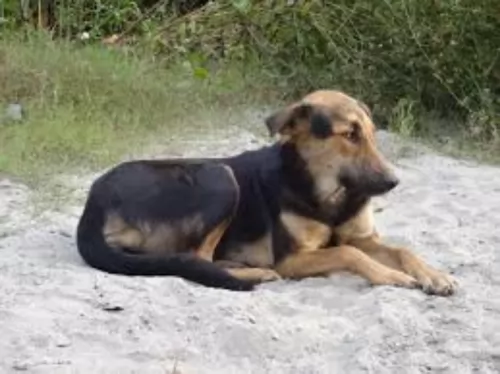 The Indian pariah, known also as the Indi-dog or In-dog, is an ancient dog breed common throughout India as well as Bangladesh.
The Indian pariah, known also as the Indi-dog or In-dog, is an ancient dog breed common throughout India as well as Bangladesh.
A breed standard does exist for the dog with the Indian Kennel Club and the dog has also been recognized by the Primitive and Aboriginal Dog Society.
A great dog enthusiast, Indian environmentalist, M Krishnan, has written about this ancient dog breed, telling about its wonderful temperament and its hardy constitution.
 The English Mastiff is a giant dog with a broad head and body. In terms of mass it is the worlds largest dog, just a little bigger that the Saint Bernard. The Great Dane and the Irish Wolfhound are 6 inches taller but do not carry the weight and bulk of the Mastiff. Mostly square in his body and his head with a massive chest and wide set forelegs. The head is square and very large. No matter the color of the coat, the face should have a black mask like the St. Bernard. His eyes and nose are also dark.
The English Mastiff is a giant dog with a broad head and body. In terms of mass it is the worlds largest dog, just a little bigger that the Saint Bernard. The Great Dane and the Irish Wolfhound are 6 inches taller but do not carry the weight and bulk of the Mastiff. Mostly square in his body and his head with a massive chest and wide set forelegs. The head is square and very large. No matter the color of the coat, the face should have a black mask like the St. Bernard. His eyes and nose are also dark.
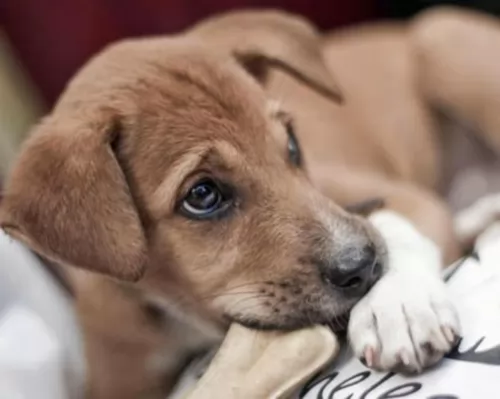 The Indian Pariah dog is a medium sized, lanky looking dog with the males and females standing at 46cm to 64cm in height and weighing roughly between 15 to 30kg.
The Indian Pariah dog is a medium sized, lanky looking dog with the males and females standing at 46cm to 64cm in height and weighing roughly between 15 to 30kg.
These dogs aren't big eaters so they tend to be lean and muscular. This is a double coated dog with the hair being coarse and fawn in colour or reddish brown.
He has fairly large, erect ears and brown eyes. He has a long tail which is held down but when he is excited it is held high and over the back, curling at the tip. There is sometimes white around the face and chest.
The Pariah dog is a social dog but he is somewhat timid, even though they make excellent watch dogs, being territorial around their human family. Being territorial, he can have an aggressive side to him so it is wise to have him trained and socialized as then he is obedient and capable of getting on well with children in the home.
These dogs are also very intelligent and therefore easily trained. He is an active dog and likes to be kept busy, wanting to be participating in the activities of his human family.
 The English Mastiff is very happy to play with children. You willl need to be careful with small children as he does not know his size and is likely to sit on them.
The English Mastiff is very happy to play with children. You willl need to be careful with small children as he does not know his size and is likely to sit on them.
This lovable giant is noble and loyal. He will protect his family and he will be courageous about it.
This is a big dog but he doesnt live outside. You need a big yard and perhaps a big house. He may not adapt to an apartment.
The English Mastiff is smart and certainly trainable. He can be independent and stubborn at times but he has the ability to learn.
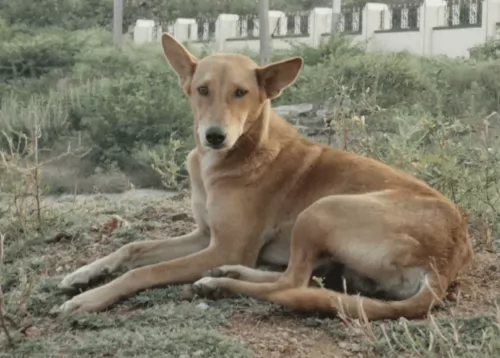 The Indian Pariah dog is just an ordinary dog looking to be a superb companion for you. These are dogs with no airs and graces and in fact they have lots of positive attributes about them.
The Indian Pariah dog is just an ordinary dog looking to be a superb companion for you. These are dogs with no airs and graces and in fact they have lots of positive attributes about them.
They are just your ordinary, social dogs who are able to form strong, loyal friendships with their human owners. He is a faithful dog breed and he has had a long association with humans dating back to thousands of years. He is healthy and cheerful and he is just waiting for you to give him a chance so that he can show you what a cheerful, playful, devoted, wonderful friend he can be to you too.
 Being a massive dog can take its toll on the body’s development and that is certainly true of the English Mastiff. A lot of running is not recommended in the early life of the dog – preferable for the first two years. This could damage the joint’s growth plates and cause him a lot of problems in later years. Too much exercise in this massive dog can hurt him but so can, not enough exercise.
Being a massive dog can take its toll on the body’s development and that is certainly true of the English Mastiff. A lot of running is not recommended in the early life of the dog – preferable for the first two years. This could damage the joint’s growth plates and cause him a lot of problems in later years. Too much exercise in this massive dog can hurt him but so can, not enough exercise.
Some of the health issues other than this that the English Mastiff is prone to include:
A large dog like the English Mastiff is always prone to pain from arthritic joints. See your vet about pain medication.
A spot under the skin that is swollen and filled with fluid. Can be treated. It is not an infection or contagious.
Can result in lameness and arthritis.
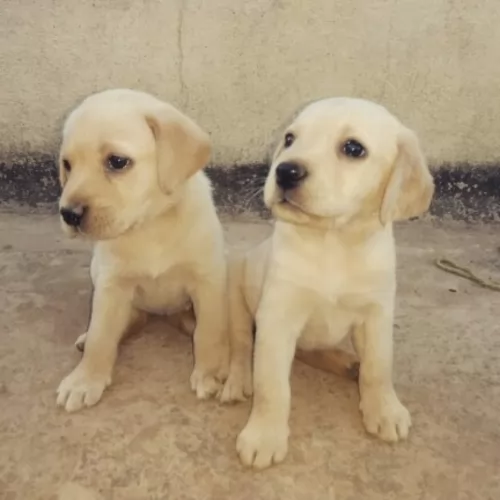 This is a dog which can live to between 13 and 15 years of age when he is treated well.
This is a dog which can live to between 13 and 15 years of age when he is treated well.
These Indian Pariahs are a natural dog breed, and to this end they are free of genetic health concerns such as hip dysplasia which is a very common ailment with nearly all dogs.
Remember that every dog stands a good chance of picking up some life-threatening illnesses if not vaccinated against them. Some of these diseases to be concerned about are canine distemper and parvo-virus. Rabies, kennel cough and parasites such as fleas and ticks can also pose a real danger to your pet.
The Pariah has been around for a very long time and today he is a robust, low maintenance pet that isn't going to cost you a lot of money .
 This is an enormous dog that grows quickly. It is important to feed them properly as they grow. If he doesn’t get what he needs as a puppy you will not be able to make it up to him later on.
This is an enormous dog that grows quickly. It is important to feed them properly as they grow. If he doesn’t get what he needs as a puppy you will not be able to make it up to him later on.
The English Mastiff puppy needs good nutrition for growing properly.
From 12-16 weeks of age feed him 3-4 cups a day of a high protein, high quality dry food. Break this up into 3-4 meals.
From 4 -6 months of age feed him 8-10 cups a day of a high protein, high quality dry food. Break this up into 2-3 meals.
From 6-18 months of age feed him 8-12 cups a day of a high protein, high quality, dry food. Break this up into 2-3 meals.
The English Mastiff is still growing from a year to 18 months. Starting at 18 months feed him 10-12 cups a day of high protein, high quality dry food. Break this up into 2 meals.
As your Mastiff ages, cut down on the protein and feed a dry food appropriate for his age.
The English Mastiff is a very large dog that should not be allowed to get obese since he is prone to dysplasia. He needs protein throughout puppyhood and until he is about 8-10.
This is a couch potato if you let him be. Make sure he gets at least one long walk per day or he will tend to gain weight. Play with them off leash about an hour every day.
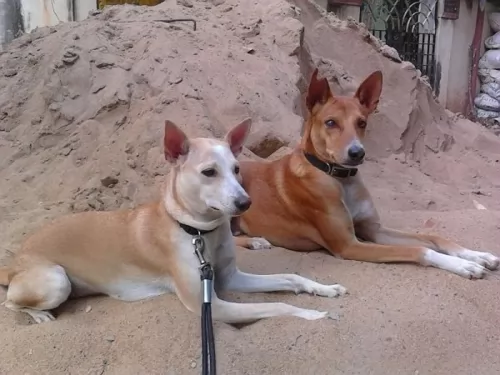 This is a low maintenance dog who also happens to shed little. A brush once or twice a week will be sufficient and it will keep the fur shiny and healthy.
This is a low maintenance dog who also happens to shed little. A brush once or twice a week will be sufficient and it will keep the fur shiny and healthy.
Your puppy will need to be vaccinated at 6 weeks of age. There are some veterinary clinics in India that offer free vaccine shots. Your puppy will be dewormed too. Make sure he has a nice dry, warm place to sleep, and for during the day, ensure that there is a shady spot for him too.
It's always a good idea to try and feed your puppy the best food there is. If you visit a veterinary clinic, find out what the most appropriate food would be for your puppy and how often you should feed him during the day.
If you feed your adult Indian Pariah dog kibble and you're able to, try and add in some home-made food too such as cooked chicken or rice. Some raw meat added in from time to time will also do your dog the world of good. Make sure there is always a bowl of cool, clean water standing by.